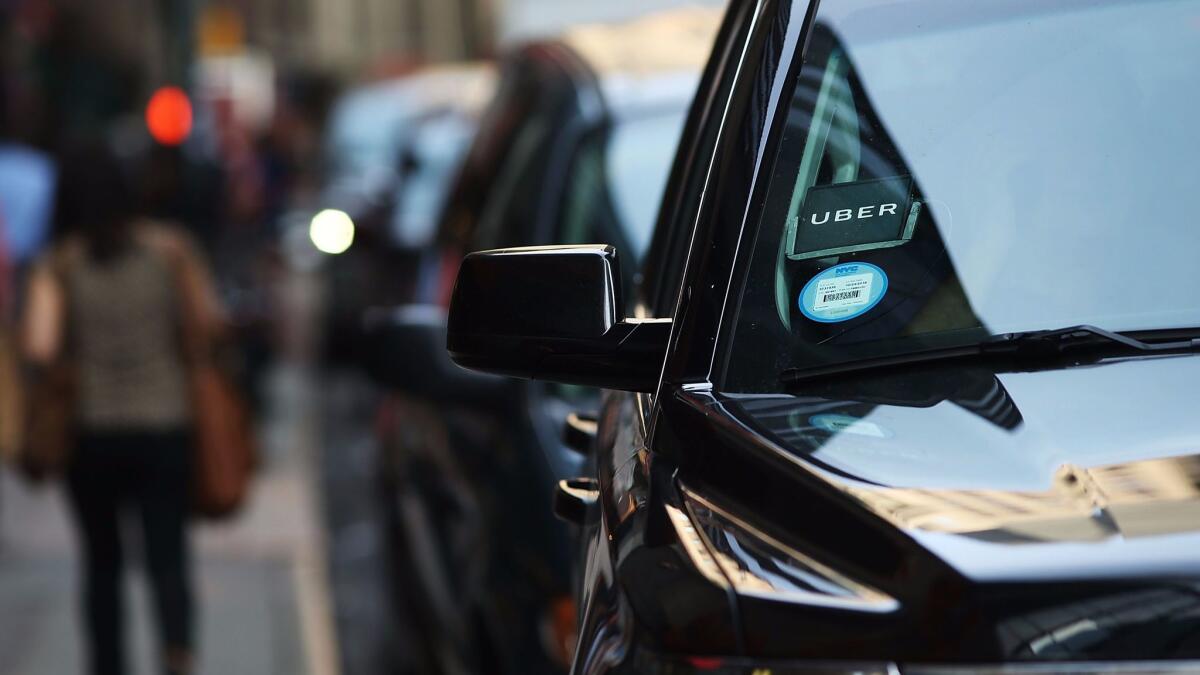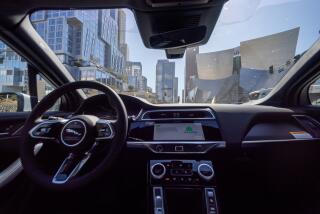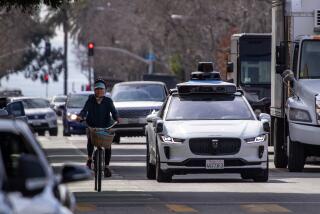Volvo to supply Uber with up to 24,000 self-driving SUVs for taxi fleet

A fleet of self-driving Volvo vehicles operated by Uber Technologies Inc. could be ready for the road as early as 2019, marking the ride-hailing firm’s biggest push yet to roll out autonomous cars.
Volvo said Monday that it would sell Uber tens of thousands of luxury sport utility vehicles between 2019 and 2021 outfitted with the Swedish automaker’s safety, redundancy and core autonomous driving technologies. Uber will then add its own self-driving technology to the autonomous taxi fleet.
For the record:
10:40 a.m. Nov. 20, 2017An earlier version of this article misstated the first name of a former Waymo employee who was accused of downloading sensitive files before he left the company. His name is Anthony Levandowski, not Andrew Levandowski.
Jeff Miller, head of auto alliances at Uber, said in a statement that the agreement put Uber on a path toward “mass produced self-driving vehicles at scale.”
The Wall Street Journal reported that the fleet described in the agreement would number 24,000 vehicles, though an Uber spokesperson said the figure is a “general framework” and not necessarily the actual number of cars that will be purchased. It’s unclear when exactly the vehicles will hit the road.
Uber could benefit from Volvo’s reputation for safety, particularly since the San Francisco firm’s reputation has suffered amid accusations of bullying, sexual harassment and discrimination at the company.
Uber was also hit in February with an intellectual property lawsuit filed by Waymo, the self-driving car company founded by Google, in a case that goes to jury selection this month.
Waymo accuses Uber of unlawfully obtaining trade secrets around its laser-based sensing system after the ride-hailing firm bought Otto, a driverless trucking technology company founded by Anthony Levandowski. Waymo alleges Levandowski downloaded thousands of sensitive files when he left the company and brought them to Uber.
Those controversies, among others, culminated in Uber’s ousting of company Chief Executive Travis Kalanick and a blow to the company’s reputation.
“For autonomy to really work, you have to have trust,” said Grayson Brulte, co-founder and president of Brulte & Co. “Right now, Uber does not have a very trusting relationship with the public.”
The Volvo deal marks one of Uber’s first major business initiatives under new CEO Dara Khosrowshahi, the former chief of travel-booking firm Expedia. Uber, which is privately held and valued at just below $70 billion, is moving toward an anticipated 2019 initial public offering.
The “framework agreement,” which Volvo said was nonexclusive, builds on an earlier agreement from 2016 in which the two companies said they would co-develop autonomous vehicles. Volvo, which was acquired by Chinese automaker Geely Holding in 2010, said it also plans to use the base vehicle in the development of its own “independent autonomous car strategy.”
Volvo said it plans to release its own fully autonomous car in 2021.
It also plans to begin importing a new line of technology-laden Chinese cars under the Lynk & Co. brand into Volvo U.S. showrooms by the end of 2019. Geely, meanwhile, has technology partnerships throughout China.
This complicated alliance is typical of the nascent autonomous vehicle industry, in which automakers, tech companies and ride-hailing firms alike are trying to figure out the best combination of partnerships to reach the market first.
Earlier this year, Uber signed an agreement with Daimler in which the German automaker planned to introduce self-driving vehicles into Uber’s ride-hailing network. That deal, unlike the Volvo one, did not mention any vehicle purchase agreements.
Last year, Uber started offering rides in self-driving Ford Fusions to passengers in Pittsburgh as part of a test of Uber’s self-driving technology, though human operators still sit in the driver’s seat.
Ford has said it will start testing self-driving cars on the ride-hailing network of Uber’s rival, Lyft. And Lyft has signed partnerships with General Motors and Waymo.
“Everyone is hedging their bets so they don’t get left behind,” Brulte said. “There’s no real indicator of who’s going to win.”
It’s unclear how far along Uber’s driverless technology is at this point. While both Volvo and Ford have said they planned to have autonomous vehicles on the road by 2021, Uber has not disclosed when its cars will drive without human safety operators.
In March, a self-driving Uber SUV rolled onto its side after it was struck by a vehicle making a left turn at an intersection in Tempe, Ariz. Local police said the Uber SUV was obeying the law at the time, and that the driver in the other vehicle did not yield.
“Maybe they’re not the leader, but they’re near the front,” said Alain Kornhauser, an autonomous vehicle expert at Princeton University.
As part of the agreement, Volvo will supply the advanced XC90 SUVs over two years. In its current version, which includes some limited autonomous driving features, the car has a starting list price of about $47,000.
“It’s another example of how the [carmakers] are orienting themselves into an ecosystem, rather than having to be at the center,” said Alexandre Marian of AlixPartners, a consulting firm.
Michelle Krebs, executive analyst at Autotrader, said she expected to see more of these kinds of partnerships between Silicon Valley companies and traditional automakers.
“It’s pretty clear that autonomous vehicles and sharing go hand in hand,” she said.
Twitter: @smasunaga | @russ1mitchell
UPDATES:
4:10 p.m.: This article was updated with additional details.
9:25 a.m.: This article was updated with comments from analyst Michelle Krebs, Princeton professor Alain Kornhauser and additional background on Uber’s autonomous vehicle program.
7:25 a.m.: This article was updated with additional information about Uber’s and Lyft’s self-driving technology development.
6:50 a.m.: This article was updated with additional details by Los Angeles Times staff.
This article was originally published at 6:15 a.m.








